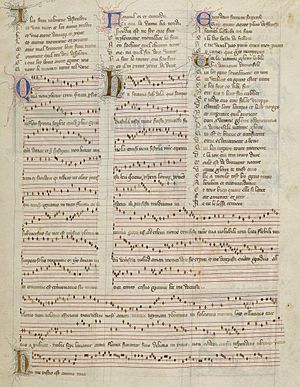Philippe de Vitry facts for kids
Philippe de Vitry (born October 31, 1291 – died June 9, 1361) was a very important French composer, poet, and music expert during the late medieval music period. He was known for his innovative music style called ars nova, which means "new art" in Latin.
People at the time thought he was a leading musician. The famous writer Petrarch even called him "the keenest and most ardent seeker of truth, so great a philosopher of our age." Philippe de Vitry is also linked to an important music book from 1322 called Ars nova notandi.
Not many of Vitry's musical pieces have survived. He wrote different kinds of music, but only some of his religious songs are still around today.
Life and Career
We don't know much about Philippe de Vitry's early life. Some old writings say he was born in the Champagne region of France. However, newer studies suggest he might have come from a place called Vitry-en-Artois. Because he was often called "Magister" (a master), people think he probably studied at the University of Paris.
Later, he became an important person in the courts of French kings like Charles IV, Philippe VI, and Jean II. He worked as a secretary and advisor for them. He also held several important church positions, including in Clermont, Beauvais, and Paris. For a while, he worked for the Pope in Avignon.
Besides his music and church roles, he was also a diplomat and a soldier. He was known to have served in a battle at Aiguillon in 1346. In 1351, he became the Bishop of Meaux, a city east of Paris.
Philippe de Vitry met many famous people of his time. These included the writer Petrarch and the well-known mathematician and philosopher Nicole Oresme. He passed away in Paris on June 9, 1361.
Music and Innovations
Philippe de Vitry is famous in music history because of the Ars nova notandi (1322). This book about music is often said to be written by him. It gave its name to the entire Ars nova music period.
Even though there's some debate about whether he wrote this book, the few musical pieces that have survived show his new ideas. He made big changes in how music was written down, especially for rhythm and measuring notes. These changes were very important. They allowed for more complex and free music to be created over the next hundred years. This led to a style called the Ars subtilior, which was even more complex.
You could say that the "modern" way of writing down rhythms started with the Ars nova. Before this, music often used repeating rhythm patterns that weren't written out note by note. The Ars nova helped music "break free" from these older ideas. The ways we write down time signatures today also started during this period.
Vitry is believed to have written many songs and motets. Motets are like short musical pieces, often for voices. Only some of his motets have survived. Each one is unique and uses a special musical structure. He is also often given credit for developing a concept called isorhythm. This is when a musical line has repeating patterns of rhythms and pitches, but these patterns overlap in interesting ways. For example, a line of thirty notes might have five repeats of a six-note tune, or six repeats of a five-note rhythm.
Five of his three-part motets can be found in the Roman de Fauvel. Another nine are in a collection called the Ivrea Codex.
Works
There is still some discussion about which musical pieces Philippe de Vitry composed. However, the first few works listed here are widely believed to be his.
- Attributed on strong historical evidence
- Aman novi / Heu Fortuna / Heu me, tristis est anima mea
- Cum statua / Hugo / Magister invidie
- Douce playsence / Garison / Neuma quinti toni
- Garrit gallus / In nova fert / Neuma
- Tuba sacre fidei / In arboris / Virgo sum
- Attributed on a combination of weaker historical evidence and stylistic grounds
- Colla iugo / Bona condit / Libera me Domine
- Firmissime / Adesto / Alleluya, Benedictus
- Attributed on stylistic grounds alone (not widely accepted)
- Almifonis / Rosa / Tenor
- Amer / Durement / Dolor meus
See also
 In Spanish: Philippe de Vitry para niños
In Spanish: Philippe de Vitry para niños
 | Sharif Bey |
 | Hale Woodruff |
 | Richmond Barthé |
 | Purvis Young |


